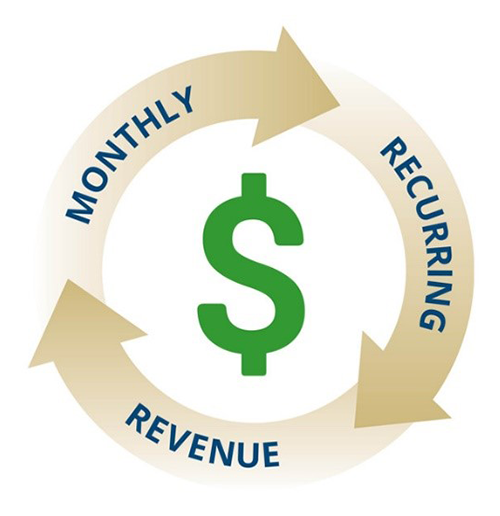Recurring Revenue is Your Secret Weapon in Your Bid to Maximize the Value of Your Business


As a small business owner, deciding to sell your business may be the hardest you’ll ever make. Once you’ve made that decision, however, the next most important thing you’ll need to do is polish up your value drivers and increase the transferable value of your business.
While doing this from the launch of your business is ideal, life happens and things get in the way. So, the next best option to get the most for your business is to start focusing on improving your value drivers 3 to 5 years before you sell if you can.
Depending on the form your business takes, one value driver you may not have considered working on is one connected to many other value drivers. That magic driver is recurring revenue.
“…a company built on recurring revenue will be more attractive to potential buyers.”
Recurring revenue is music to the ears of potential buyers because it equals stable, predictable cash flow. Recurring revenue can take a variety of forms including maintenance contracts, monthly support agreements, annual license agreements, warranties, consumables, and subscriptions, and result in both a reliable revenue source and a higher value for your business.
Recurring Revenue Allows for Both Stable Cash Flow and Potential Growth
What is the top item in a buyer’s mind, the foremost factor they want from purchasing a business? Revenue and cash flow. Because the value of your business will always be tied to perceived risk, the higher the recurring revenue, the higher the value of your business.
A buyer’s interest is sparked when a company can show recurring revenue because that means they can breathe easier after they take ownership, knowing they’ll continue to have revenue sources after you leave. This reduces the risk of lost revenue just because you’ve moved on.
“Recurring revenue is guaranteed revenue for some period of time (for example, through a product subscription).”
And that’s the crux of it. Recurring revenue is guaranteed. While making large, upfront sales feel great and are a welcome addition to the cash flow, as nonrecurring revenue, they’re far less valuable as they’re unpredictable and risky. And because recurring revenue takes far less effort, it has the added benefit of higher profit margins—a quality prized by buyers.
Take Apple as a case in point. Switching from a one-time software purchase model to a monthly subscription model raised its market capitalization from $16 billion to $35 billion in a meager 2 years.
 Because recurring revenue is simply the opposite of large, one-time purchases, you can create recurring revenue for your business just by thinking creatively and analyzing your products, processes, or services to see what can be offered on a monthly or yearly basis instead. In doing so, you may also see where you can sell more products, processes, or services to your existing customers with upselling or cross-selling. It’s even possible you may find places where you’re giving away something you can actually monetize. This equals not only recurring revenue, but also increasing revenue, hence future growth.
Because recurring revenue is simply the opposite of large, one-time purchases, you can create recurring revenue for your business just by thinking creatively and analyzing your products, processes, or services to see what can be offered on a monthly or yearly basis instead. In doing so, you may also see where you can sell more products, processes, or services to your existing customers with upselling or cross-selling. It’s even possible you may find places where you’re giving away something you can actually monetize. This equals not only recurring revenue, but also increasing revenue, hence future growth.
“The evidence shows us that businesses with recurring revenue models have higher valuations than those that don’t.”
Can you institute service fees or establish maintenance contracts for your products? Can you lease or finance your product? Can you develop training courses or create a retainer system?
Software companies sell monthly subscriptions for access to their software, property management companies have long-term management agreements with landlords and leases with tenants, and those staffing companies that temporarily place workers earn monthly revenue. Owners and buyers alike appreciate recurring revenue like this because it requires less effort and reinvestment and encourages growth.
Buyers will always pay more for companies with stable cash flow and growth potential, and recurring revenue is their top predictor because the revenue of this sort keeps on giving with little effort, offering a buyer peace of mind and security.
 Recurring Revenue is Reliable and Can Sustain Your Business
Recurring Revenue is Reliable and Can Sustain Your Business
Money that comes in regularly such as it does with service fees, subscriptions, and maintenance schedules offers your business, and a potential purchaser, a steady stream of revenue that you can predict. This predictability lays a strong foundation for a steady financial future for you and a new owner, raising the value of your business and your final sale price.
“The gift that keeps on giving, a recurring revenue stream gives you a predictable base that can be built on each year as opposed to starting from scratch.”
Regular revenue also ties in with other value drivers such as having a diverse customer base, goodwill, margin advantage, and growth potential. With money going in the bank on a recurring basis, you can see your customer’s changing needs and offer better service, more effectively determine your ideal customer, and set your prices on the value you offer your customers rather than relying on undercutting your competitors just to land the client.
All this combined adds up to reliability, a priority for buyers and one that will result in a higher value for your company, and a better price when you sell it. Because this revenue is so reliable and stable, not only will it serve to increase your profits and the value of your business, it will also put your business in a better position to weather economic downturns, both for you currently and for a new owner.
 At the same time, the reliability of recurring revenue means that a new owner can count on that revenue right off the hop the moment they take ownership. Buying a business requires tremendous financial resources and obligations, and this instant revenue relieves some of that pressure. It even offers a new owner the opportunity to forecast future revenue and budget accordingly with little effort.
At the same time, the reliability of recurring revenue means that a new owner can count on that revenue right off the hop the moment they take ownership. Buying a business requires tremendous financial resources and obligations, and this instant revenue relieves some of that pressure. It even offers a new owner the opportunity to forecast future revenue and budget accordingly with little effort.
Wrapping Up
Here’s the bottom line: businesses with high recurring revenue more often than not sell for higher prices. That one fact should be enough to make you look at your business and analyze where and how you can change what you’re currently doing to introduce a recurring revenue model before you sell.
That’s not to say you have to overhaul your entire business. Simply take a look at your current processes to see what you can alter. Restaurants can offer rewards programs, shops can offer monthly specialized product clubs, and even professional services can offer a retainer business model.
Once you do introduce recurring revenue, you’ll benefit from added profits, reduced margins, and sustainability through tough financial times, and all with less effort invested, leaving you free to concentrate on ways to additionally benefit from your recurring revenue, such as upselling and cross-selling, and better meeting your customer’s needs.
Because selling your business is the largest transaction you’re likely to ever make, overshadowing even the sale of your house, follow the advice of Business Development Canada, and get outside help from experts when it’s time for you to sell. Experts in mergers and acquisitions can help you avoid the common mistakes that invariably crop up when owners sell on their own such as spreading the word—telling the world your business is open to buyers. Experts know this actually leads to negative perceptions of your business, so they will ensure confidentiality.
Muise Mergers & Acquisitions Inc. offers confidentiality throughout the sale process and works to maintain a steady, forward momentum, ensuring negotiations never stall and interest never wanes. Call them now at (902) 456.6473 or send them an email if you’re serious about selling and want to realize a price your business is truly worth.



